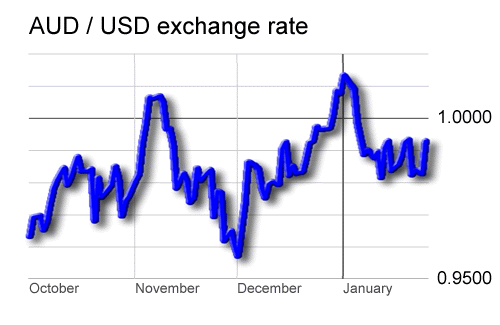

By Roger J Kerr
The Kiwi dollar appears to have temporarily de-linked from EUR/USD movements. The Kiwi did not move down too much against the USD when the EUR/USD rate dipped below $1.3000 in December, and now the Euro has surprisingly rebounded to $1.3600 the Kiwi has not exactly roared higher either.
To me, the recent EUR strength on the back of some mis-placed Euro-babble on inflation/monetary tightening will not last long.
The ECB will be looking straight-through any inflation coming from higher food/commodity prices and not raising their interest rates anytime soon.
What the Europeans should do
They should be cutting their interest rates to get their consumers spending again. They should observe Bernanke’s seemingly successful monetary stimulus measures in the US as the best policy response.
If 'risk-off' settings in global investment markets coincide with stronger US economic data (GDP numbers this week) and negative news out of Europe over coming weeks, the NZD/USD rate should follow the EUR/USD rate lower.
We are still forecasting the EUR/USD rate to drop to $1.2500 and $1.2000 this year.
Outside China/commodity price/Australian economy influences, the NZD/USD rate appears likely to move lower over the first half of 2011 to 0.7000 and below, and then reverse back upwards over the second half of 2011 as the RBNZ lift the OCR.
What will China do?
The wild-card variable for the Kiwi dollar this year is Chinese inflation, economic growth and their monetary policy response.
If the PBOC over-reacts to the rising inflation and tightens monetary policy too hard, hard commodity prices will fall sharply resulting in a stronger USD and much weaker AUD exchange rate.
The Kiwi would follow the AUD downwards in such a scenario; however to a lesser extent as NZ interest rates will be increasing over the second half and Aussie interest rates will be static.
The AUD rate against the USD has traded above 1.0000 on three separate occasions over recent months and has not been able to hold above the parity level each time (see chart below).
Why the AUD is at risk
I suspect that global currency players are not comfortable at being long AUD’s at these high levels if there is a risk of a sudden shift down in hard commodity prices due to the China effect.
Perhaps as the Queensland floods and the loss of the Ashes in cricket tell us, the good luck has all but run out on the lucky country and their currency as well.
The RBA are 'on hold' with monetary policy adjustments and will also be 'looking-through' short-term/food related inflation increases and forecasting lower GDP growth this year for the Australian economy.
Lower commodity prices may also slowdown the massive capital/investment inflows out of Asia into Australia over recent years that have pushed the AUD up.
High consumer confidence is starting to wane in Australia and their spectacular jobs growth numbers seen last year may also be much less impressive this year. It all adds to a less certain Australian economic outlook and the 'one-way' bet on the AUD currency last year as they increased interest rates looks far less assured this year.
The offshore drivers (EUR and AUD) will dominate NZD/USD direction over the first six months of 2011; however increasing NZ interest rates over the second half will yet again make the NZ dollar a reasonable trade for the currency markets, reversing the first half losses.

--------------------
* Roger J Kerr runs Asia Pacific Risk Management. He specialises in fixed interest securities and is a commentator on economics and markets. More commentary and useful information on fixed interest investing can be found at rogeradvice.com

We welcome your comments below. If you are not already registered, please register to comment
Remember we welcome robust, respectful and insightful debate. We don't welcome abusive or defamatory comments and will de-register those repeatedly making such comments. Our current comment policy is here.